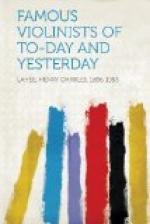“Oh,” exclaimed Ole Bull, “you were mistaken, for I did not read that piece, I knew it before.” “It makes no difference,” was the reply, as the sleighs parted.
As young Ole approached manhood, and developed in strength and stature, we find him asserting his independence. His father, who intended him to be a clergyman, engaged a private tutor named Musaeus, who, when he found that Ole’s musical tastes conflicted with his studies, forbade him to play the violin, so that the boy could only indulge at night in an inclination which, under restraint, became a passion. Ole and his brothers had long and patiently borne both with cross words and blows from this worthy pedagogue, and at length decided to rebel. Accordingly when one morning at half-past four the tutor appeared and dragged out the youngest from his warm bed, Ole sprang upon him and a violent struggle ensued. The household was aroused, and in a few moments the parents appeared on the spot in time to see Musaeus prostrate upon the floor and suing for peace. Contrary to his expectations, Ole found himself taken more into his father’s confidence, and as a result he became more desirous than ever of carrying out his father’s wishes.
In 1828 he went to the university in Christiania, where, in spite of the best intentions, he soon found himself musical director of the Philharmonic and Dramatic Societies, a position which gave him independence, and somewhat consoled him for his failure to pass his entrance examinations for the university. His father reluctantly forgave him, and he was now, in spite of everything, fairly launched upon a musical career.
He was not long contented to remain in Christiania. His mind was in a state of restless agitation, and he determined to go to Cassel, and seek out Spohr, whose opinion he desired to secure. He accordingly left Christiania on May 18, 1829. His departure was so hurried that he left his violin behind, and it had to be forwarded to him by his friends. This suddenness was probably caused by the fact that he had taken part in the observance of Independence Day on May 17th, a celebration which had been interdicted by the government.
On reaching Cassel he went to Spohr, who accorded him a cold reception. “I have come more than five hundred miles to hear you,” said Ole Bull, wishing to be polite. “Very well,” was the reply, “you can now go to Nordhausen; I am to attend a musical festival there,” Bull therefore went to Nordhausen, where he heard a quartet by Maurer, of which Spohr played the first violin part. He was so overwhelmed with disappointment at the manner in which the quartet was played by the four masters that he came to the conclusion that he was deceived in his aspirations, and had no true calling for music.




